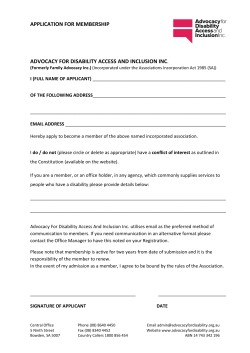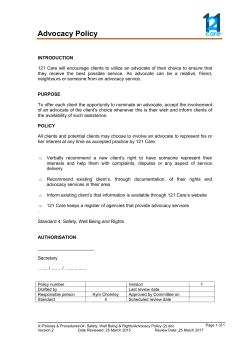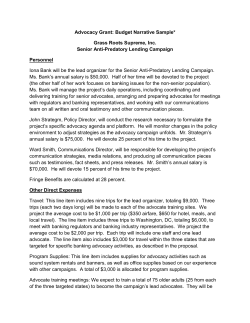
Family Advocacy - Advocacy for Disability Access and Inclusion Inc.
Family Advocacy Inc - History 1981 was the International Year of the Disabled and parents were asked to have their say on behalf of their sons or daughters with a disability. The parents met with important committees to talk about disability awareness in the community. A group of parents acted as advisors for the State Government in starting new and different disability services and to establish the Intellectually Disabled Persons’ Services Act, 1986. Funds wer provided by both the South Australian and Federal Governments to start Parent Advocacy and it was incorporated in 1986. Before that time, many parents accepted that “professionals” knew more about on their children’s special needs. They soon realized that they were “the experts” in knowing what their child needed. Or at least they should have the opportunity to be involved in the decisions being made by others about what their son or daughter needs. In 2006 Parent Advocacy changed its name to Family Advocacy. Families have changed over the past twenty years. They were traditionally made up of two parents and their children but now there are many single parents, siblings, grandparents and other family members caring for people with a disability. Family Advocacy has helped many families to be involved in decision making and to work with disability services so that families of a person with a disability can get better opportunities for their family members who have disabilities. Family Advocacy has a membership of over 800 families in South Australia. It is a small advocacy agency with a central office in Bowden, covering the central, southern and western regions and two other offices. A country office in Clare covers the Far/Mid North, Riverland and Yorke Peninsula areas and office in Campbelltown that covers the northern and north/eastern metropolitan region. Today Family Advocacy is funded by the Federal Department of Family and Community Services and Indigenous Affairs (FaCSIA) to provide mainly Family advocacy. However Family Advocacy also provides Individual advocacy directly to the person with the disability and Systemic advocacy; advocacy at a system level. Funded by the Department of Families, Housing Community Services & Indigenous Affairs VISION: To achieve better life opportunities for people with disabilities and their families. AIM: To help the person with a disability to have a better life by advocating for each person and his/her family. To enable people with disabilities to access their community and achieve better education, service provision and employment opportunities by advocating for the person or/and their family to fully participate in decision making and to work together with professionals as true partners. The Family Advocate in your area can: Provide advocacy support for a person with a disability to have a voice in decisions that affect his/her life. Provide advocacy support for family members who need to speak on behalf of their family member with a disability. Stand with and help individuals who have a disability and families caring for a person with a disability to gain access to services or to improve services. Encourage, empower and support people with a disability toward independence through self advocacy. Encourage, empower and support family members, parent groups and networks to advocate for family members with a disability Provide information on opportunities for people with a disability and their families to gain the skills to advocate. SELF ADVOCACY Advocating for yourself or for a family member with a disability What people with a disability and family members have said to us: “I feel alone in the meetings – There are more people telling me what I should do and nobody on my side” “I am made to feel guilty about asking for services or for better services for my son/daughter” “I get shuffled from one person to the next an no-none seem to be able to give me an answer” “When I complain I feel that I am letting people down. I need help to get my point across” “I would like to learn how to be more confident and assertive at these meetings” “I get angry and frustrated that I cannot say what I want to say – I am too emotional to begin with” Family Advocacy can help you to advocate for yourself by: Talking about what you want to happen Helping you to “make a plan” of action Helping find out all the information you need Finding out the best person to speak to about your complaint or your problem Helping you to write an agenda or a letter to the service or to a politician Supporting you to be at and to speak at any meetings you need to attend Speak for you if it becomes too emotional Help with keeping important papers and meeting notes safe Making more appointments to make sure everything is going to plan As a member of Family Advocacy -you have the right to: o confidentiality o privacy o respect o be listened to o have your opinions valued o have everything explained in a way you can understand o an interpreter if you need one o be kept informed o see your file o negotiate changes to your personal file o have information released to other agencies only with your prior written consent o say “no” to help o make a complaint about Family Advocacy or one of its workers The Importance of “Family” The best advocate for a person with a disability who needs support to be heard in decisions and issues that affect his/her life can be a family member. Family Advocacy Inc recognises the many ways that a “family” is seen and accepted by society today. The definition of “family” has broadened beyond that of the traditional nuclear family and includes carers, Aboriginal kinship, foster parents and other significant people in a person’s life. Sometimes people with disabilities are unable to advocate for themselves and it can be said that parents and other family members are too emotional and too closely involved to be the best advocates. On the other hand, it is precisely because they are closely and personally involved over a long period of time, that family members can be or become the best advocates. In many cases family members have the most at stake, are closely involved and have the sense of urgency needed to ask for the change to happen. Families can also identify with other families in similar situations. From time to time people with a disability and their families need help to achieve better opportunities through advocacy. The person and his/her family may require a short term advocacy partnership to help and guide them to resolve a complaint, to find out what options are available, and to learn how to advocate for themselves. When armed with the necessary skills, family members often become outstanding advocates. Family Advocacy does not: Take over job of other co-ordinators or case workers Take over a person’s life (or problems) and make all the decisions for him/her Stop people helping themselves Make people feel helpless or dependent Keep people “in the dark” and do everything for them Try to control individuals and families Expect individuals and families to “make do” with services Accept poor services Pretend the problem does not exist Stop individuals and parents from becoming activists
© Copyright 2025









